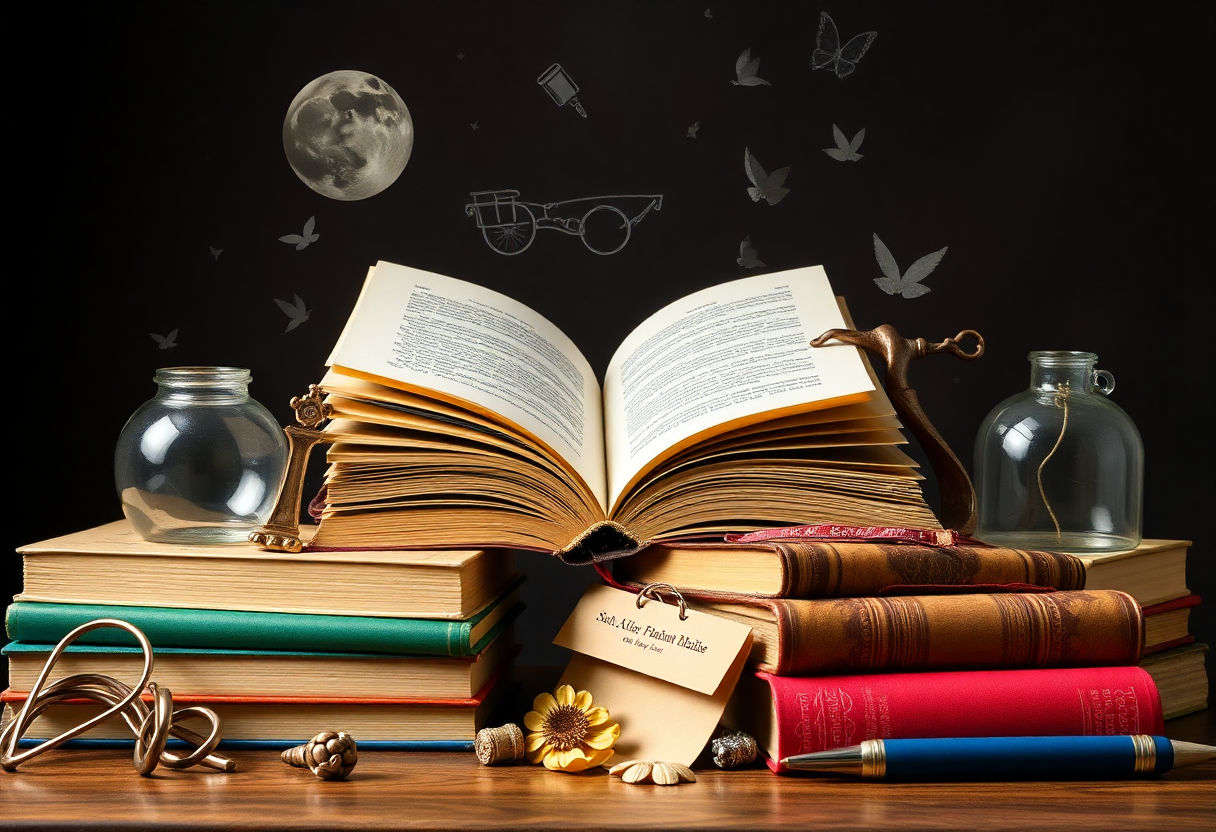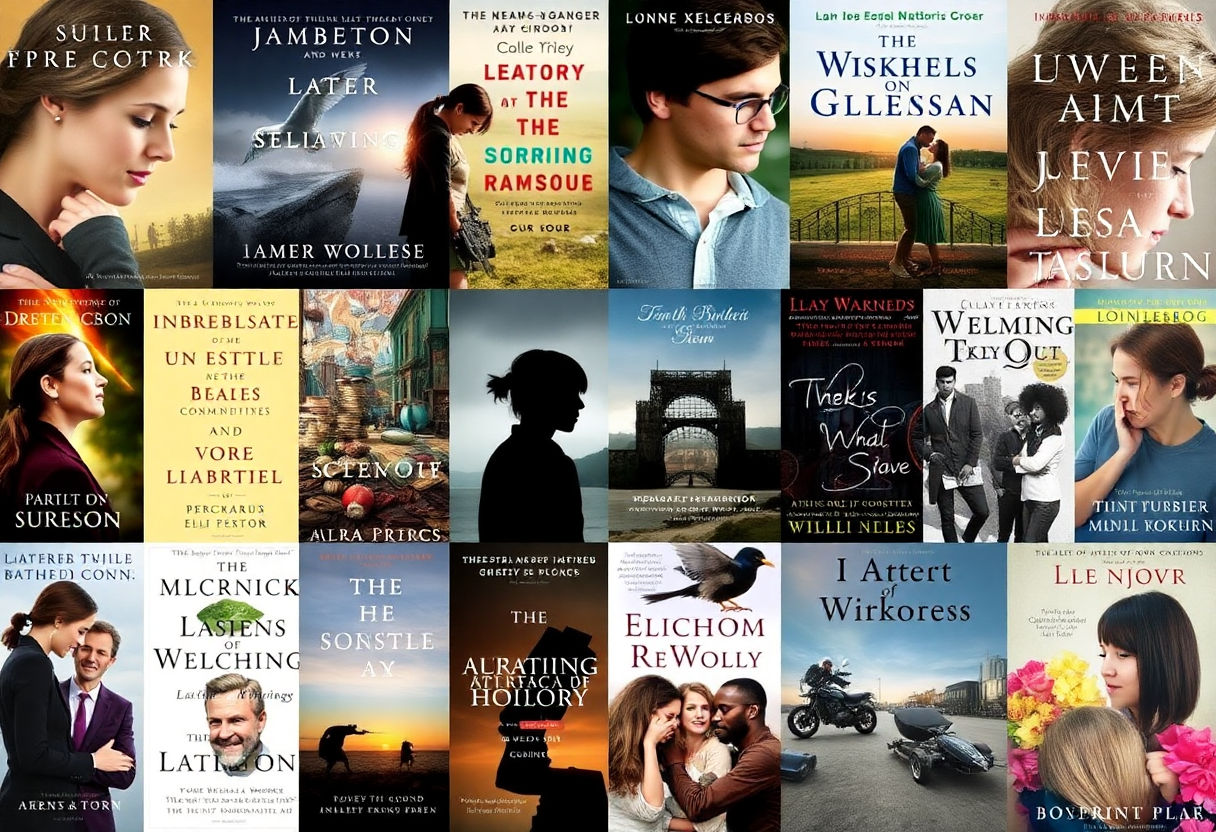Exploring the enchanting world of academic romance books offers a delightful fusion of passion and intellectual themes. These novels captivate readers by intertwining romantic plots with intellectually stimulating contexts, appealing to a broad audience. As the genre grows in popularity, it sheds light on cultural and social dynamics through various themes such as forbidden love and intellectual rivalry. Moreover, the settings of these stories play a crucial role in enriching the narrative, adding depth and complexity to the characters. This article delves into these facets, highlighting the genre’s allure and its impactful authors, while also addressing its challenges and future trends.
Key Takeaways
- Academic romance books seamlessly blend intellectual themes with romantic plots, appealing to a broad range of readers.
- The genre has seen a rise in popularity, partly due to its ability to stimulate critical thinking while entertaining.
- Common themes include forbidden love and intellectual rivalry, which add depth and intrigue to the narratives.
- The academic setting contributes significantly to character development, enriching the overall storytelling.
- These novels offer cultural and social insights by reflecting on contemporary dynamics within intellectual environments.
The Rise of Academic Romance Novels

The academic romance novel genre has witnessed a remarkable surge in popularity over the past few decades, captivating readers who seek both intellectual stimulation and romantic escapism. Tracing back to its origins, this genre finds its roots in classic literature, where intellectual settings often served as the backdrop for intricate love stories. However, in recent years, it has carved out a distinct niche that resonates with modern audiences.
Several factors contribute to the genre’s increased prominence. Firstly, the blend of academia and romance provides a unique appeal that sets these novels apart from more conventional romance narratives. Characters immersed in scholastic environments often grapple with both personal and intellectual growth, adding layers of complexity and authenticity to their interactions. This duality of themes enriches the storytelling, allowing for diverse character development.
Moreover, the rise of academic romance reflects societal trends towards valuing education and intellectual pursuits. In an era where knowledge is power, readers are drawn to stories that celebrate wisdom and explore the dynamics of intellectual camaraderie. Both young adults and seasoned readers appreciate plots that challenge and intrigue, offering insights into the interconnectedness of the head and heart.
A contemporary twist to the genre’s allure arises from its capacity to examine modern issues within academic settings, such as gender roles, cultural diversity, and the pressures of scholarly achievement. By weaving these into romantic plots, academic romance novels not only entertain but also provoke thought, making them a compelling choice for readers who relish stories rich with meaning.
Themes and Tropes in Academic Romance
Academic romance novels captivate readers by intertwining the complexities of the intellectual pursuit with the shimmering allure of romance. Among the most compelling themes are forbidden love, wherein dynamics between professors and students fuel a narrative charged with tension and the allure of the unattainable. This particular trope not only fascinates readers but also invites them to explore the ethical nuances and boundaries inherent in such relationships.
Another prevalent theme is intellectual rivalry, where characters are often pitted against one another in academic settings. This rivalry serves as a backdrop for character development, fostering growth and understanding. The contrast between professional ambition and personal affection creates a rich narrative tension that keeps readers engaged.
Additionally, mentorship dynamics play a crucial role in these stories, providing a framework where characters navigate their aspirations and emotions. The power imbalance inherent in mentor-mentee relationships offers a fertile ground for examining themes of power, respect, and admiration.
Key tropes in academic romances often include the “enemies-to-lovers” and “slow-burn romance,” both of which appeal to readers who relish gradual narrative evolution and the eventual triumph of love over initial discord. The academic setting, with its intense focus on knowledge and achievement, serves as a perfect foil to the emotional depth these novels explore.
These themes and tropes not only entertain but provoke thought, challenging readers to consider the interplay between rational thought and emotional vulnerability in academic environments, thus providing a profound depth to the reading experience.
Impact of Academic Settings on the Narrative
Academic settings play a pivotal role in enhancing the narrative and character development within academic romance novels. The intellectual atmosphere provided by universities, research institutions, and libraries creates a unique backdrop that is both stimulating and challenging for the characters involved. This enriched environment fosters a dynamic interplay between romance and academia, where characters are often portrayed as more than just love interests—they are thinkers, scholars, and mentors engaging in profound intellectual debates.
Within these settings, the characters often experience significant personal growth and transformation. The rigorous academic environment demands that characters grapple with complex ideas, contributing to their development and maturation as they navigate both their academic and romantic journeys. Another critical aspect is the authenticity of student life and academic pressures, which adds layers to the narrative as characters juggle demanding coursework, research commitments, and personal relationships.
Furthermore, academic settings offer a rich tapestry of interpersonal dynamics, such as mentorship, intellectual rivalries, and the challenges of balancing ambition with emotion. These elements not only drive the plot but also provide fertile ground for exploring themes of identity and self-discovery. For instance, characters may unravel hidden talents or passions through their academic pursuits, which can harmoniously or tumultuously intertwine with their love lives.
In effect, the backdrop of academia in these novels serves as a catalyst for storytelling, allowing for a nuanced exploration of characters’ inner worlds while they strive to achieve both romantic fulfillment and professional excellence. This setting not only amplifies the tension and depth of the narrative but also invites readers into a world where love and knowledge are inextricably linked.
Cultural and Social Insights

Academic romance novels serve as a fascinating mirror reflecting cultural and social dynamics. These narratives often delve into contemporary issues, offering readers a lens to examine social constructs within educational settings. They portray diverse relationships, showcasing the intersection of personal and professional lives.
-
Reflection of Diverse Cultures: Many academic romances highlight the richness of various cultures, emphasizing how cultural backgrounds influence characters’ academic and romantic pursuits. This portrayal fosters a deeper understanding of societal diversity and inclusivity.
-
Addressing Social Challenges: These novels frequently tackle social issues such as gender equality, power dynamics, and class disparities. Through characters’ experiences, readers can explore the complexities of societal norms and expectations.
One of the genre’s key strengths lies in its ability to confront and challenge stereotypes. By presenting characters who defy traditional roles, academic romances encourage readers to question preconceived notions about intelligence, gender, and relationships. For example, female protagonists are often depicted as both intellectually formidable and romantically engaging, a duality that reflects ongoing societal shifts towards gender equality.
Furthermore, the academic setting itself acts as a microcosm of society, often unraveling hierarchies and power structures in educational institutions. The interplay between academic ambition and romantic desires can highlight issues of privilege and access, making these novels not only entertaining but also intellectually stimulating.
In essence, academic romance books offer more than just a love story set against an educational backdrop—they provide a nuanced exploration of cultural and social intricacies, inviting readers to engage with larger societal dialogues through the personal journeys of the characters.
Famous Academic Romance Authors

Prominent figures in the realm of academic romance literature have significantly contributed to its recognition and respectability. Their works not only captivate readers but also underscore the sophisticated interplay between academic environments and romantic narratives.
Among these esteemed authors is A.S. Byatt, known for her intricate storytelling and attention to scholarly detail. Her novel “Possession” merges historical research with emotive tales of love, offering readers a glimpse into the intellectual lives of her characters as they navigate both personal and professional pursuits.
Diana Gabaldon also stands out with her Outlander series, blending history, romance, and time travel. Although not strictly confined to academic settings, Gabaldon’s background in zoology and quantitative scientific methods enriches her novels with an academic depth that has mesmerized readers worldwide.
Another influential writer is Gabrielle Zevin, whose book “Tomorrow, and Tomorrow, and Tomorrow” presents a compelling narrative set against the backdrop of game design academia. Zevin masterfully explores themes of creativity and intellectual partnership, interwoven with intricate personal relationships.
These authors have shaped the genre by integrating elements such as intellectual rivalry, mentorship, and forbidden love, engaging readers with their profound understanding of both scholarly and romantic endeavors. Their distinctive voices push the boundaries of conventional romance, challenging stereotypes and infusing the genre with a notable degree of intellectual sophistication.
These literary artists continue to redefine academic romance, offering nuanced insights into the melding of knowledge and passion, thereby advancing the genre’s evolution and appeal.
Challenges and Criticisms
Academic romance novels, while captivating and intellectually stimulating, face several challenges and criticisms that deserve scrutiny. One primary concern is the perpetuation of stereotypes and clichés within the genre. Critics argue that certain narratives often rely on overused tropes, such as the troubled genius or the aloof professor, which can detract from the depth and originality expected in literary works.
Moreover, the frequent portrayal of power dynamics in academic settings, especially between faculty and students, can raise ethical questions. While some narratives handle these themes with nuance, others are criticized for glorifying inappropriate relationships, potentially influencing readers’ perceptions of real-world academic environments.
Additionally, there is a tendency for some academic romance novels to be perceived as elitist, focusing predominantly on characters from privileged backgrounds. This can limit the genre’s relatability and potential message of inclusivity. Critics argue that a narrower focus on specific academic institutions or demographics may not reflect the diversity of real-life educational environments.
Despite these challenges, the genre holds possibilities for evolution. By addressing these criticisms, authors can strive to create narratives that are both compelling and responsible. This evolution could include representing a broader array of voices and experiences, ensuring that romance in academic settings enhances character depth and narrative complexity. The potential for innovation remains vast, offering opportunities for academic romance to redefine and enrich its role within literary landscapes.
Bridging Romantic and Intellectual Worlds

Academic romance books offer readers a fascinating intersection where romantic themes and intellectual pursuits merge, creating an engaging narrative that appeals to both the heart and mind. This unique blend is achieved through settings that often depict universities and scholarly environments, rich in cultural and historical context. These novels craft relationships that blossom amid debates, lectures, and intellectual discoveries, allowing readers to explore profound connections beyond mere physical attraction.
The backdrop of academia adds an enriching dimension to the romantic storyline, as characters often engage in thought-provoking conversations on literature, philosophy, or science. This juxtaposition of romance and intellectualism cultivates a space where emotional depth and cognitive complexity coexist harmoniously. For instance, characters may fall in love over shared passions for solving complex problems or through a mutual journey of academic discovery that deepens their understanding of each other and the world.
Moreover, these novels illuminate the dynamics of power and knowledge inherent in such environments. Romantic relationships in academic settings can often involve mentors or colleagues, highlighting themes of power balance and mutual respect. This adds another layer of complexity, as characters navigate personal and professional boundaries, allowing stories to delve into nuanced explorations of human behavior and relationships.
Ultimately, academic romances captivate readers by offering stories that are intellectually stimulating while simultaneously tugging at the heartstrings. They bridge the gap between romantic allure and intellectual engagement, promising a fulfilling reading experience that challenges and entertains in equal measure.
Future Trends in Academic Romance Literature
In recent years, the academic romance genre has embraced innovative trends that promise to reshape its landscape. Diverse Representations are at the forefront, with an increased emphasis on inclusivity, allowing readers to explore romances across a wide spectrum of races, genders, and orientations. This shift not only enriches narratives but also offers varied perspectives on love and academia.
Another emerging trend is the incorporation of Technological Advancements within academic settings. With the rise of digital learning environments and online education, authors are creatively weaving these elements into their plots, presenting unique challenges and exciting opportunities for romantic development.
Moreover, there is a noticeable movement towards Interdisciplinary Narratives, where academic romance transcends single fields of study. This encourages complex plotlines where protagonists might be engaged in explorations that combine, for instance, the sciences with the arts, creating multidimensional characters and intricate story arcs.
The genre is also experiencing a revival in Historical Academic Romance, driven by interest in how past intellectual climates influenced relationships. This allows authors to explore timeless themes of love and knowledge against historical backdrops, providing readers with both entertainment and education.
Lastly, the demand for Eco-Conscious Stories is rising, where romance plots are intertwined with themes of environmental awareness and sustainability. Set within educational institutions leading ecological initiatives, these stories not only captivate but also inspire readers to reflect on global challenges.
These trends indicate a vibrant and evolving future for academic romance literature, one that is more inclusive, innovative, and responsive to contemporary social issues.
Conclusion
Academic romance novels continue to captivate readers by intertwining themes of love and intellectual pursuit, offering insights into cultural dynamics and human connections. As this genre grows in popularity, it presents opportunities for innovative storytelling that bridges romantic and intellectual worlds, fostering both escapism and critical thought. Looking ahead, these narratives may further evolve, challenging stereotypes and enriching the tapestry of literary genres. Readers and writers alike are encouraged to explore these stories, as they hold vast potential for reflection and understanding of the intersections between emotion, intellect, and social forces.
Frequently Asked Questions
What makes academic romance books unique compared to other romance genres?
Academic romance books stand out due to their fusion of intellectual pursuits with romantic plots. They delve into themes such as intellectual rivalry and mentorship dynamics, offering readers a narrative enriched by academic settings.
Why are academic settings so significant in these novels?
Academic settings provide a backdrop that fosters character development and complex plotlines. They allow for explorations of forbidden love and intellectual challenges, enhancing the depth and relatability of the story.
Are there notable authors in the academic romance genre?
Yes, many renowned authors have emerged in this genre, each contributing uniquely to its evolution. Their works often blend scholarly themes with relatable romantic narratives, attracting a diverse readership.
What challenges does the academic romance genre face?
This genre encounters criticisms surrounding stereotypes and the use of overplayed tropes. Despite these challenges, successful novels continue to innovate by integrating fresh perspectives and narratives.
What does the future hold for academic romance literature?
The future of academic romance literature looks promising, with trends indicating a rise in stories that seamlessly marry romantic and intellectual elements. This evolution is expected to attract even broader audiences and inspire nuanced storytelling.



